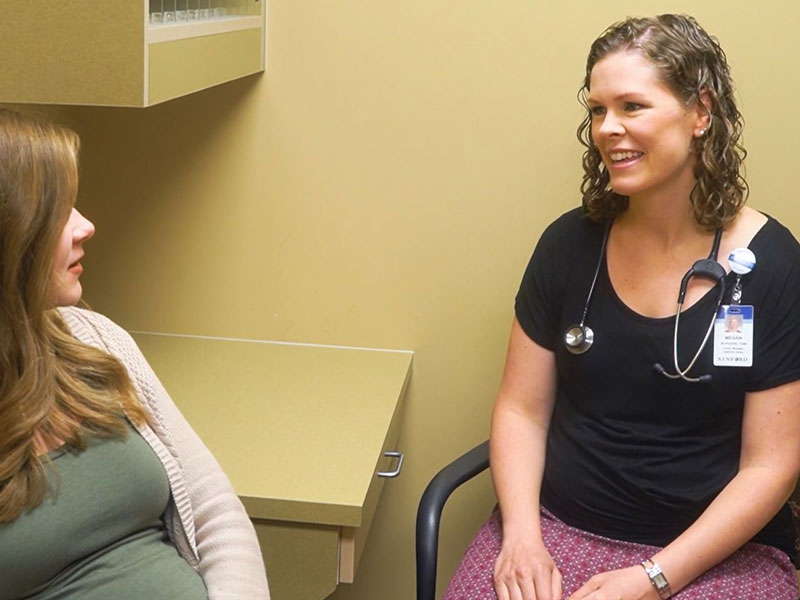Midwives play a big role in women’s health care before, during and after pregnancy care. We’re here to dispel any confusion surrounding midwives and the services they provide.
Considering a midwife? Find one near you
Myth: Midwives only offer pregnancy care
The care a midwife can provide goes beyond pregnancy and childbirth. Midwives provide a personal, relationship-based approach to a full scope of care needs. This includes family planning, postpartum care, menopause care and gynecological care.
“We can care for women before puberty, before their first period all the way up not only to but through menopause,” says Megan Burgers, C.N.M., a certified nurse-midwife at Sanford Health.
A midwife can perform your daughter’s first pap smear and be her health care provider throughout her life.
“It’s a beautiful continuity of care,” says Burgers.
Myth: Midwives lack formal training
A certified nurse-midwife has a master’s degree in nursing and has been certified with special training in midwifery. When women choose to receive care from a midwife, they have access to the highest standard of care and a variety of options.
In fact, the care a midwife offers is all about options.
“We come at women’s health from a perspective of wholeness and wellness and education and options. And I would say that we’re passionate about providing education and options,” says Burgers. “I love teaching women about how their bodies work so that they can make personalized choices for themselves.”
Myth: You can choose either a midwife or a doctor – not both
At Sanford Health, that myth couldn’t be farther from the truth.
“We are well integrated into the Sanford umbrella, meaning we have easy access to our colleagues,” says Burgers. “Our offices are right around the corner from the OB/GYNs.”
Midwives work hand-in-hand with physicians – through collaboration, connection and referrals. If necessary, midwives can get in touch with experts quickly and easily. They have access to maternal-fetal medicine, obstetrics, gynecology and reproductive endocrinology specialists.
In short: You can work with both. This also extends to your primary care. You can see a family medicine provider for your general wellness care and a midwife for your OB/GYN needs.
Myth: Midwives only work with low-risk pregnancies
If a woman has a high-risk pregnancy or one with complications, she can still have a nurse-midwife on her care team.
Women can work with maternal-fetal experts to get the specialized care they need. After those appointments, they can pop over to a midwife for all their other pregnancy needs. Even for high-risk pregnancies, midwives can still deliver the baby in many cases.
If you choose to or need to deliver via C-section, your OB/GYN provider will perform the surgery, but a midwife can offer support in other ways. They’ll be by your side during surgery and beyond.
When caring for pregnancies that seem low risk, midwives are always on alert for signs of complications. If something does go wrong, help is often just down the hall.
“We can seamlessly discuss what’s going on, what needs to happen and help move towards whatever is necessary to help keep her and the baby safe,” says Burgers.
Pregnancy care you can count on
Having a midwife by your side during your pregnancy gives you access to a variety of care options – not fewer.
“We have longer appointment times to be able to have longer conversations. Not necessarily just medical focused but also discussing the holistic whole person,” says Burgers.
When women feel supported, it can affect every aspect of childbirth.
“Making a woman feel comfortable and safe in labor is vitally important for not only her experience but the labor process itself. It actually influences the hormones and chemicals involved in the labor process. And so, we talk during the pregnancy about comfort options,” says Burgers.
Midwives offer all pain relief options, including medications like epidurals. Women can also explore natural alternatives like water births.
“I encourage people to bring up questions and ask for alternatives and see what’s out there,” says Burgers.
Find a certified nurse-midwife near you.
Learn more
- Podcast: Supporting natural birth through low intervention
- New ‘wellness guide’ role helps women easily navigate care
- Learn secrets for an easier labor and delivery
…
Posted In Children's, Health Information, Menopause Care, Pregnancy, Women's
